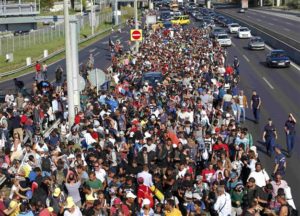Global refugee burden not shared equitably
The developed world is becoming more insular, less welcoming and ambivalent to the plight of the planet’s most vulnerable people, if two new surveys are to be believed.
The surveys paint a picture of the first world becoming inured to the situation of 65 million displaced people around the globe and more suspicious of refugees and the perceived link between the migration crisis and terrorism.
A new study by London-based non-government organisation Oxfam found the six wealthiest countries on Earth together host less than 9 per cent of the world’s refugees.
The US, the UK, France, China, Japan and Germany make up more than half of the global economy, but in 2015 they hosted a total of just 2.1 million refugees and asylum seekers – or 8.88 per cent of the world’s total.
 Meanwhile, Jordan, Turkey, Pakistan, Lebanon, South Africa and the Occupied Palestinian Territories host more than 50 per cent of the world’s refugees, despite accounting for less than 2 per cent of the world’s economy.
Meanwhile, Jordan, Turkey, Pakistan, Lebanon, South Africa and the Occupied Palestinian Territories host more than 50 per cent of the world’s refugees, despite accounting for less than 2 per cent of the world’s economy.
Oxfam says that while Germany took in far more refugees and asylum seekers than other wealthy countries, there is still an unfair gap between rich and poor nations in providing shelter for the majority of the world’s refugees.
Oxfam used data from the United Nations refugee agency, UNHCR, and the UN Relief and Works Agency (UNRWA), which was set up in 1949 to aid Palestinian refugees.
“It is shameful so many governments are turning their backs on the suffering of millions of vulnerable people who have fled their homes and are often risking their lives to reach safety,” said an Oxfam spokesperson.
The world is currently facing the largest recorded displacement crisis in history with more than 65 million people displaced as refugees or asylum seekers; or internally displaced within their own countries.
Oxfam says the crisis is due to conflict, violence, persecution or natural disasters.
It says that while the Syrian conflict is a major driver of displacement, refugees are also fleeing war-torn countries including South Sudan, Burundi, Iraq and Yemen.
Syrians, Afghans and Iraqis make up the majority of refugees worldwide.
Oxfam’s report comes two months before the September 19 UN Summit on Large Movements of Refugees and Migrants, the first meeting of its kind on the global displacement crisis.
The Oxfam report came as another study found that Europe’s ongoing refugee crisis and the threat of terrorism are “very much related” in the minds of many people.
The study by the Washington-based Pew Research Center found “fear and resentment” towards refugees and asylum seekers in 10 European countries.
It found many people believed that refugee resettlement would lead to an increased risk of terrorism.
In Hungary, 76 per cent of respondents felt this way, as did 52 per cent in the UK and 46 per cent in France.
More than 80 per cent of people surveyed in Hungary said they believed “refugees are a burden on our country because they take our jobs and social benefits” – a sentiment shared by 46 per cent of people in the UK and 72 per cent in Greece.
The lowest percentage, 32 per cent, was in Germany, which received the highest number of asylum seekers in 2015.
The study also found widespread negative views of Muslims across Europe, particularly in the south and east. More than 60 per cent of those surveyed in Hungary, Italy, Poland and Greece said they had an unfavorable view of Muslims.
Negative views of Muslims have increased in the UK, Spain and Italy in the past year; and older persons, those with less education and people who identify as political conservatives across the countries surveyed were more likely to have negative views of Muslims.
But the percentage of the people who said they believed most or many Muslims in their countries support militant organisations like the Islamic State group (ISIS) is less than half in all 10 nations surveyed.
The study also looked at European attitudes toward cultural differences, concluding that “relatively few Europeans believe diversity has a positive impact on their countries,” and that they are divided on what national identity means.
Almost all – 97 per cent – of respondents across all 10 countries said being able to speak the national language was very or somewhat important to a sense of national identity.
In the UK, Sweden and Spain, around one-third of respondents said more cultural diversity was favorable, but none recorded a majority of people saying increasing diversity is a positive for their country.
In Australia, close to 85 per cent of people agree with the proposition ‘multiculturalism has been good for Australia’.
Laurie Nowell
AMES Australia Senior Journalist












